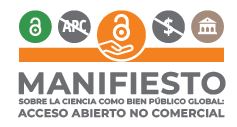Satisfaction with the profession chosen by the education student. Case: "Rafael María Baralt" National Experimental University
DOI:
https://doi.org/10.5281/zenodo.10866314Keywords:
satisfaction, needs, career choiceAbstract
The objective of the article was to determine the satisfaction with the profession chosen by the students of the Education Program of the "Rafael María Baralt" National Experimental University (UNERMB), Ciudad Ojeda. The research was descriptive with a non-experimental-transectional design; the population consisted of twenty-five students from the program, who were consulted through an instrument of Satisfaction Inventory with the Chosen Profession, consisting of thirty-three items. The data were processed through SPSS version 20, which showed that the order level that predominates according to Maslow's hierarchy of needs is the highest, in addition to the prevailing need for belonging. It is concluded that there is satisfaction in students with the chosen profession.
Downloads
References
Arias, Fidias (2012). El Proyecto de Investigación. Introducción a la Metodología científica. Editorial Episteme 6 edición Caracas, Venezuela
Casas, Sol (2016). Satisfacción con la Profesión Elegida en estudiantes de enfermería de una universidad pública. Trabajo para optar al título de Licenciado en Enfermería. Universidad Nacional Mayor de San Marcos Lima, Perú.
Díaz, María y Soares, Dulce (2016). La elección Profesional en la Orientación de la carrera de los universitarios. Revista Psicologia: Ciência e Profissão. Vol. 32, No. 2: pp. 272-283
Garmendia, José y Parra, Luis (1993). Sociología Industrial y de los recursos humanos. Editorial Taurus. Madrid, España.
Ginzberg, Eli; Ginsburg, Sol; Axelrad, Sidney y Herma, John (1969). Occupational choise. Columbia University. New York. USA.
Hernández, Roberto; Fernández, Carlos y Batista, Pilar (2014). Metodología de la Investigación. Editorial McGraw Hill/Interamericana. México D.F., México.
Mankeliunas, Mateo (1978). Psicología de la Motivación. Editorial Trillas. México D.F., México.
Maslow, Abraham (1991). Motivación y personalidad. Editorial Díaz de Santos S.A. Madrid, España.
Prieto, Ana; Mijares, Brizeida; Fernández, Mariana y Martínez, Marle (2011). Satisfacción con la carrera elegida para la búsqueda de empleo de los estudiantes del Programa Ingeniería del Núcleo Costa Oriental de Lago de la Universidad de Zulia. Revista Impacto Científico. Vol. 6 Nº 2, 2011, pp. 207 – 227. Documento en línea. Disponible en: https://produccioncientificaluz.org/index.php/impacto/article/view/33211/34878. Consulta: 28/04/2014.
Sabino, Carlos (2003). El Proceso de Investigación Científica. Editorial Panapo. Caracas, Venezuela.
Vildoso, Jesahel (2002). Influencia de la autoestima, satisfacción con la Profesión elegida y la formación profesional en el coeficiente intelectual de los estudiantes del tercer año de la Facultad de Educación. Tesis para optar al grado de Magíster en Educación, mención Docencia en el Nivel Superior. Universidad Nacional Mayor de San Marcos. Lima, Perú.
Downloads
Published
How to Cite
Issue
Section
License
Copyright (c) 2021 Universidad Alonso de Ojeda

This work is licensed under a Creative Commons Attribution-NonCommercial-ShareAlike 4.0 International License.
All content of Ethos Journal will be free access, distributed under the Creative Commons license (BY-NC-SA).




